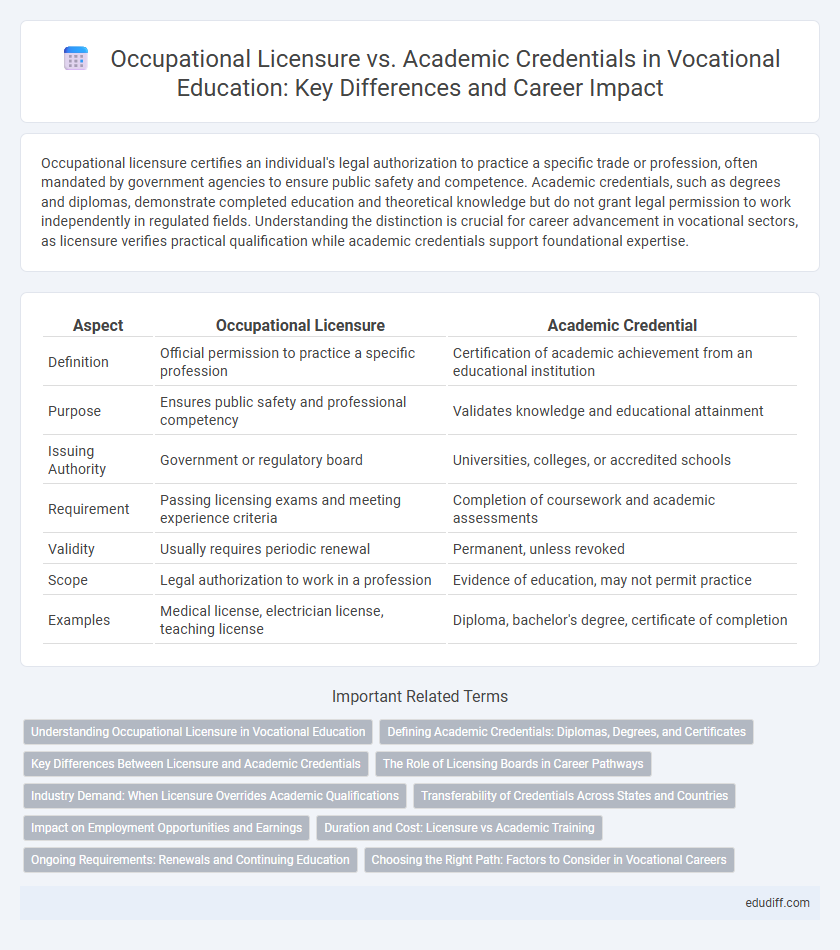Occupational licensure certifies an individual's legal authorization to practice a specific trade or profession, often mandated by government agencies to ensure public safety and competence. Academic credentials, such as degrees and diplomas, demonstrate completed education and theoretical knowledge but do not grant legal permission to work independently in regulated fields. Understanding the distinction is crucial for career advancement in vocational sectors, as licensure verifies practical qualification while academic credentials support foundational expertise.
Table of Comparison
| Aspect | Occupational Licensure | Academic Credential |
|---|---|---|
| Definition | Official permission to practice a specific profession | Certification of academic achievement from an educational institution |
| Purpose | Ensures public safety and professional competency | Validates knowledge and educational attainment |
| Issuing Authority | Government or regulatory board | Universities, colleges, or accredited schools |
| Requirement | Passing licensing exams and meeting experience criteria | Completion of coursework and academic assessments |
| Validity | Usually requires periodic renewal | Permanent, unless revoked |
| Scope | Legal authorization to work in a profession | Evidence of education, may not permit practice |
| Examples | Medical license, electrician license, teaching license | Diploma, bachelor's degree, certificate of completion |
Understanding Occupational Licensure in Vocational Education
Occupational licensure in vocational education ensures that individuals meet specific government-mandated standards required to legally perform certain trades or professions, such as electrician or cosmetologist. Unlike academic credentials that validate educational attainment through degrees or certificates, occupational licenses focus on public safety and competence by requiring exams and practical assessments. Obtaining licensure often involves rigorous training aligned with state regulations, ensuring practitioners possess the necessary skills and knowledge to deliver quality services within their vocation.
Defining Academic Credentials: Diplomas, Degrees, and Certificates
Academic credentials encompass diplomas, degrees, and certificates that validate the completion of structured educational programs in various fields. Diplomas often signify foundational vocational skills, degrees represent comprehensive mastery in academic disciplines, and certificates highlight specialized training or skill acquisition. These credentials serve as formal recognition of expertise, differing fundamentally from occupational licensure, which grants legal permission to practice specific professions.
Key Differences Between Licensure and Academic Credentials
Occupational licensure certifies an individual's legal authorization to practice a specific profession, often regulated by government agencies and requiring meeting standardized competency exams and work experience. Academic credentials, such as diplomas or degrees, signify the completion of educational programs and theoretical knowledge without guaranteeing the legal right to perform professional tasks. Licensure emphasizes regulatory compliance and public safety, while academic credentials focus on educational attainment and foundational expertise.
The Role of Licensing Boards in Career Pathways
Licensing boards establish and enforce standards to ensure competency and public safety in various vocations, often requiring candidates to pass exams and meet experience criteria. Unlike academic credentials, which primarily signify educational achievement, occupational licensure directly regulates entry into professions such as healthcare, construction, and cosmetology. These boards play a pivotal role in career pathways by validating practical skills and maintaining industry-specific professional standards.
Industry Demand: When Licensure Overrides Academic Qualifications
Occupational licensure often carries greater weight than academic credentials in industries with stringent regulatory requirements, such as healthcare, construction, and aviation, where legal compliance ensures worker and public safety. Employers prioritize candidates with state-issued licenses because these credentials validate practical skills and adherence to industry standards beyond theoretical knowledge. This demand drives professionals to pursue licensure, especially in sectors where hands-on expertise and legal authorization directly impact job eligibility and career advancement.
Transferability of Credentials Across States and Countries
Occupational licensure often involves state-specific requirements, resulting in limited transferability across states or countries without additional examinations or certifications. Academic credentials typically offer broader recognition internationally, facilitating easier transferability for further education or employment. Understanding these differences is crucial for professionals seeking mobility in their vocational careers.
Impact on Employment Opportunities and Earnings
Occupational licensure often directly enhances employment opportunities by legally authorizing individuals to practice in specific trades, resulting in higher job security and access to specialized roles that typically command increased earnings. In contrast, academic credentials provide broader knowledge and transferable skills valued across multiple industries but may not guarantee immediate licensure or job placement in regulated professions. Employers frequently prioritize licensure for roles requiring compliance with safety and competency standards, significantly influencing wage premiums and long-term career advancement.
Duration and Cost: Licensure vs Academic Training
Occupational licensure typically requires a shorter duration, ranging from several months to two years, with costs generally focused on examination fees and licensing applications, making it more affordable than academic credentials. Academic training for vocational careers often spans two to four years, including tuition, textbooks, and associated fees, which can significantly increase total expenses. The faster completion and lower upfront costs of licensure programs appeal to individuals seeking rapid workforce entry, while academic credentials offer broader educational depth but at higher time and financial investment.
Ongoing Requirements: Renewals and Continuing Education
Occupational licensure requires ongoing renewals and mandatory continuing education to maintain professional competence and comply with regulatory standards. Academic credentials, while foundational for career entry, generally do not mandate periodic renewal or formal continuing education, focusing instead on initial certification. Licensing boards often set specific credit hour requirements and renewal cycles to ensure practitioners stay current with industry advancements and safety protocols.
Choosing the Right Path: Factors to Consider in Vocational Careers
Choosing between occupational licensure and academic credentials depends on career goals, industry requirements, and regulatory standards in vocational fields. Occupational licensure provides legal authorization and ensures compliance with safety and professional standards, often mandatory for roles like electricians or healthcare technicians. Academic credentials emphasize foundational knowledge and theoretical expertise, beneficial for careers that require advanced study or certification beyond initial licensure.
Occupational licensure vs Academic credential Infographic

 edudiff.com
edudiff.com